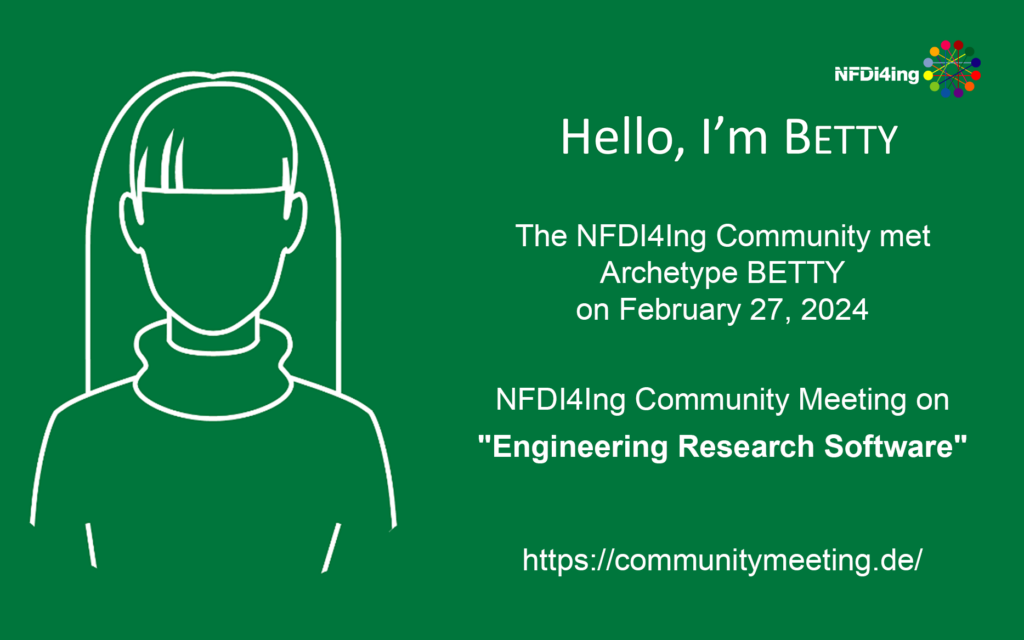Scientists from all engineering communities were invited to learn about innovative tools and services that make it easier to find, use and develop research software and handle the associated data and metadata.
Abstracts and available publications of the contributions can be found at:
https://communitymeeting.de/

The NFDI4Ing organises several community meetings each year to present the latest developments, tools and services for RDM in engineering sciences to researchers, infrastructure operators and the interested public. Use cases and best practices are presented, needs and challenges are discussed – and researchers often have the opportunity to try tools and applications in hands-on sessions.
NFDI4Ing Community Meetings 2024
This year’s community meetings focus on the NFDI4Ing archetypes which represent typical RDM challenges and engineering research profiles (https://nfdi4ing.de/archetypes/). Those archetypes structure the work programme and task areas of the NFDI4Ing project. The series of events was kicked off by Task Area „Betty“ and the community cluster „Construction engineering and architecture“. Task Area Betty focuses on Engineering Research Software and aims to provide engineers with tools and knowledge that are necessary and useful to develop validated, quality-assured engineering research software.
On 27 February, 52 participants took part in the event, scientists from various engineering disciplines as well as infrastructure operators.
The agenda included a comprehensive presentation on continuous integration as well as a demonstration of several tools and services developed within the Task Area Betty. Last but not least, the results of a project receiving support from an NFDI4Ing Seed Fund Project were presented.
Use cases and tool presentations
The first contribution came from Tomislav Maric (TU Darmstadt) and Moritz Schwarzmeier (TU Darmstadt), who presented two use cases in which continuous integration (CI) pipelines were applied, namely in an industrial research project with Bosch, and in the development of an ALE-Interface-Tracking framework in OpenFOAM (Presentation: https://doi.org/10.5281/zenodo.10714900). In addition, Sören Peters (TU Braunschweig) and Sven Marcus (TU Braunschweig) demonstrated the SURESOFT HPC-Workflow that combines the tools Singularity, HPC-Rocket and FieldCompare to enable easy integration of CI pipelines with HPC Clusters with regression testing (https://www.tu-braunschweig.de/suresoft).
Then it was time for „Betty“: Vasiliy Seibert (TU Clausthal) gave a live demonstration of the tool “Betty’s Research Engine” (https://nfdi4ing.rz-housing.tu-clausthal.de/), a service that allows users to search for existing research software tailored for specific applications. The screencast of his presentation is published on the TIB-AV portal (https://doi.org/10.5446/66914). Next up was Anett Seeland (Uni Stuttgart) to introduce the JupyterHub instance of NFDI4Ing, its current state of development and possible future extensions (https://jupyter.nfdi4ing.de/). Possible sample applications of the JupyterHub allowed users to try out the tool live.
Finally, the third session focussed on further NFDI4Ing tools that facilitate and improve the use of research software. Sarbani Roy (Uni Stuttgart) presented the Harvester-Curator, a tool to elevate metadata provision in data and/or software repositories. The event was rounded off by a contribution submitted by Simon Dierl (TU Dortmund University) and Falk Howar (Fraunhofer ISST Dortmund). Dierl demonstrated how schemas for data and metadata can be used as a solution to the problem of missing format standardization and the lack of clear separation between benchmarks’ data and metadata which hinders the reuse of benchmarks.
Conclusion and outlook
The participants enriched the event during discussions with numerous interesting questions and further information. In conclusion, participants as well as organisers Bernd Flemisch (University of Stuttgart), Katja Wermbter and Jan Linxweiler (both TU Braunschweig) agreed, that the community meeting had provided an informative insight into current developments in engineering research software.
Bernd Flemisch (University of Stuttgart)
Jan Linxweiler (TU Braunschweig)
Katja Wermbter (TU Braunschweig)
